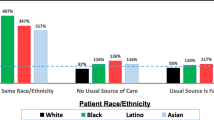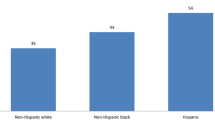Abstract
BACKGROUND: Experts recommend that health care providers (HCPs) collect patients’ race/ethnicity, but HCPs worry that this may alienate patients.
OBJECTIVE: To determine patients’ attitudes toward HCPs collecting race/ethnicity data.
DESIGN: Cross-sectional survey.
PARTICIPANTS: General Internal Medicine patients (n = 220).
MEASUREMENTS: Perceived importance of having HCPs collect race/ethnicity data, their concerns about this, comfort level providing this information, and reactions to 4 statements explaining the rationale for collecting this.
RESULTS: Approximately 80% somewhat or strongly agreed that HCPs should collect information on patients’ race/ethnicity. However, 28% had significant discomfort (score 5 or less on 10-point scale) reporting their own race/ethnicity to a clerk, and 58% were somewhat or very concerned that this information could be used to discriminate against patients. Compared with whites, blacks, and Hispanics felt less strongly that HCPs should collect race/ethnicity data from patients (P=.04 for both pairwise comparisons), and blacks were less comfortable reporting their own race/ethnicity than whites (P=.03). Telling patients that this information would be used for monitoring quality of care improved comfort more than telling patients that the data collected (a) was mandated by others, (b) would be used to guide staff hiring and training, and (c) would be used to ensure the patient got the best care possible.
CONCLUSIONS: Most patients think HCPs should collect information about race/ethnicity, but many feel uncomfortable giving this information, especially among minorities. Health care providers can increase patients’ comfort levels by telling them this will be used to monitor quality of care.
Similar content being viewed by others
References
Committee on Understanding and Eliminating Racial and Ethnic Disparities in Health Care. Unequal Treatment: Confronting Racial and Ethnic Disparities in Health Care. Washington, DC: Institute of Medicine; 2003.
Panel on Racial and Ethnic Disparities in Medical Care. The Right to Equal Treatment. Washington, DC: Physicians for Human Rights; 2004.
Fiscella K, Franks P, Gold MR, et al. Inequality in quality: addressing socioeconomic, racial, and ethnic disparities in health care. JAMA. 2000;283:2579–84.
Bierman AS, Lurie N, Collins KS, et al. Addressing racial and ethnic barriers to effective health care: the need for better data. Health Aff (Millwood). 2002;21:91–102.
Panel on DHHS Collection of Race and Ethnicity Data. Eliminating Health Disparities: Measurement and Data Needs. Washington, DC: National Academies Press; 2004.
Ashton CM, Haidet P, Paterniti DA, et al. Racial and ethnic disparities in the use of health services: bias, preferences, or poor communication? J Gen Intern Med. 2003;18:146–52.
Hasnain-Wynia R, Pierce D, Pittman MA. Who, What, When, Where: The Current State of Data of Collection on Race and Ethnicity in Hospitals. New York, NY: Commonwealth Fund; 2004.
Atkinson JO, MacDorman MF, Parker JD. Trends in births to parents of two different races in the United States: 1971–1995. Ethnic Disparities. 2001;11:273–85.
Bureau US Census. US census quick facts. 2003. Available at http://quickfacts.census.gov/qfd/states/00000.html. Accessed March 31, 2005.
League of Women Voters. Classification by race, ethnicity, color, or national origin. League of women voters 2003. Available at http://ca.lwv.org/lwvc/edfund/elections/2003/pc/prop54.html. Accessed March 31, 2005.
Public Opinion Strategies. Key findings from a national survey conducted among adults who have health insurance coverage on behalf of the Robert Wood Johnson Foundation on the issue of disparities in health care. Robert Wood Johnson Foundation. 2005. Available at http://www.rwjf.org/news/POSfullMemo.pdf. Accessed March 31, 2005.
Office of Management and Budget. Revisions of the standards for classification of federal data on race and ethnicity. Fed Regist. 1997;62:587–9.
Betancourt JR. Cultural competence—marginal or mainstream movement? N Engl J Med. 2004;351:953–5.
Boulware LE, Cooper LA, Ratner LE, et al. Race and trust in the health care system. Public Health Rep. 2003;118:358–65.
Doescher MP, Saver BG, Franks P, et al. Racial and ethnic disparities in perceptions of physician style and trust. Arch Fam Med. 2000;9:1156–63.
Keating NL, Gandhi TK, Orav EJ, et al. Patient characteristics and experiences associated with trust in specialist physicians. Arch Intern Med. 2004;164:1015–20.
Jones JH. Bad Blood, The Tuskeegee Syphilis Study. Revised Edition. New York, NY: The Free Press; 1993.
Harrison RW, Impact of biomedical research on African Americans. J Natl Med Assoc. 2001;93(suppl):6–7S.
Immigrant Healthcare Attacked. Las Culturas.com. 2004. 10-150004. Available at http://www.lasculturas.com/aa/press_nclr_091404.htm. Last accessed March 31, 2005.
Texas Health & Safety Code. 108.009(k), 2004.
Author information
Authors and Affiliations
Additional information
The authors have no conflicts of interest to report.
This study was funded by The Commonwealth Fund (grant number 20020739) and the Health Research and Educational Trust.
Rights and permissions
About this article
Cite this article
Baker, D.W., Cameron, K.A., Feinglass, J. et al. Patients’ attitudes toward health care providers collecting information about their race and ethnicity. J GEN INTERN MED 20, 895–900 (2005). https://doi.org/10.1111/j.1525-1497.2005.0195.x
Received:
Revised:
Accepted:
Issue Date:
DOI: https://doi.org/10.1111/j.1525-1497.2005.0195.x




